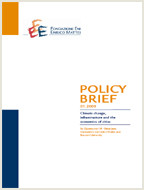The hidden trade-off between climate policy and sustainability: an obstacle or a source of incentives to achieve an agreement?
The possible outcomes of climate negotiations in view of a future commitment after the Kyoto protocol have been mostly evaluated on the basis of their economic costs and the risk of growth slowdown, or in consideration of the feasibility of possible coalitions. However, the effect of such policies on Sustainability has hardly been considered. This becomes a major challenge since achieving a Sustainable Development has been recognized to be one of the main goals of modern societies. Given that climate change is a global problem, this matter should be considered not only at the regional and national levels but most importantly at the worldwide level, as it should be made sure that mitigation policies have an overall positive effect once all components of Sustainability are considered. This Policy Brief introduces the study of Sustainability within an international mitigation effort, taking as a reference point the pledges of the Copenhagen Accord proposed after COP-15. The analysis of its possible implications is then studied using the FEEM Sustainability Index (FEEM SI), a comprehensive measure which summarizes economic, social and environmental components. The results are not as straightforward as one may expect. While a global reduction of GHGs will greatly improve the environmental component, it generally has a negative effect on the economic and social spheres. Moreover, despite the usual debate on the economic costs of climate policies, the economic pillar is not as negatively affected as the social one. It is therefore crucial to introduce social policies to attenuate the social costs of climate policy alone. Such combinations are more likely to lead to a Sustainable Development, and therefore to be accepted by developing countries, which will allow progress on climate negotiations.

